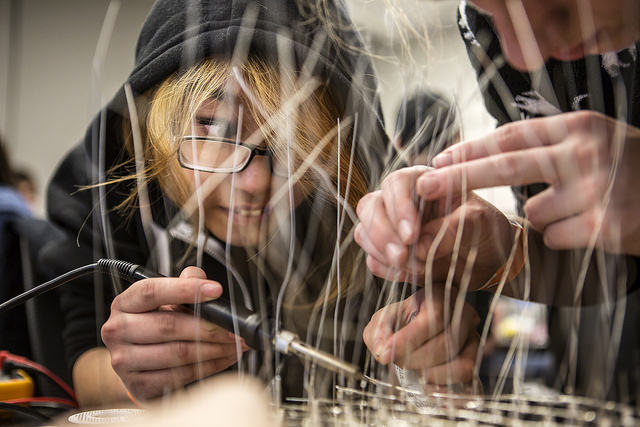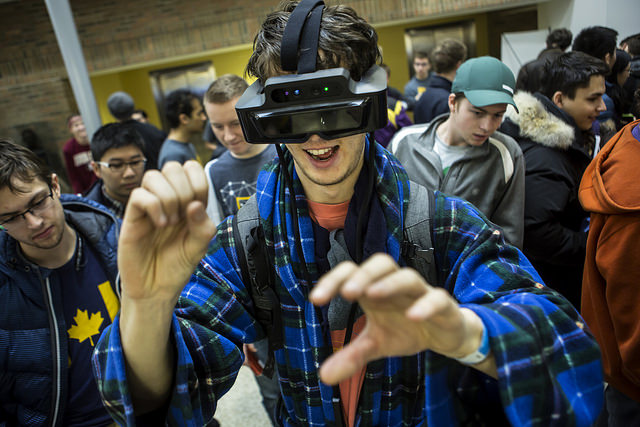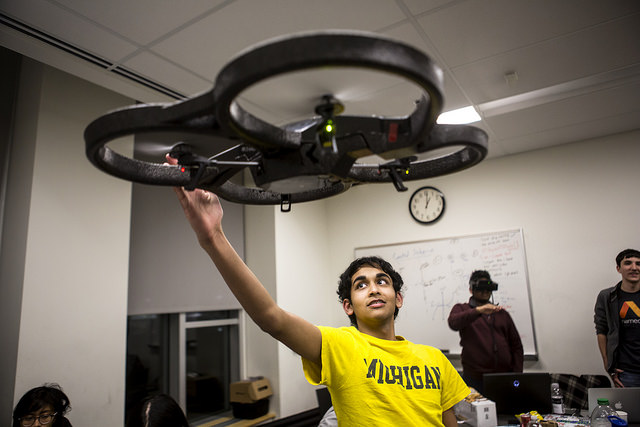MHacks Continues to Impress with Over 1,200 Participants at Hackathon
There’s a greater emphasis on learning and diversity in thought, background, and action. And as a result MHacks is redefining the hackathon and the hacker.

 Enlarge
Enlarge
Since its inception in February 2013, MHacks, the university’s semi-annual event that helped spark the nation’s college hackathon movement, has grown from a just-for-fun challenge to a sophisticated operation that draws big sponsors and students from a variety of backgrounds.
Hacks have gone from short-term creations to impressive longer-term ventures.
Last weekend, more than 1,200 students from dozens of universities descended on North Campus for the fifth event to spend 36 hours making apps, sites and devices.
They had cutting edge tools like Google Glass, augmented-reality technology and 3-D sensing tablets. They had mentors from top companies including Apple, Microsoft, Google and LinkedIn.

 Enlarge
Enlarge
MHacks has evolved from the “bigger is better” mentality of 2014, when it set a world record with more than 1,200 hackers working day and night at Michigan Stadium.
Thousands of students were inspired to bring hackathons back to their own schools, to work on their tech-passions more often, and use their weekends to build things. A movement was started, and MHacks has ridden the “hacker culture” momentum since.
But more perhaps more important is how MHacks is advancing the culture it helped to establish.
“Much like innovation and entrepreneurship is expanding to all corners of the university, MHacks is reaching students from more diverse backgrounds and inspiring them to turn their ideas into action,” said Thomas Zurbuchen, senior counselor to the provost for entrepreneurship education. “It’s not just tech students anymore, and they’re creating some really remarkable things.”
Previous MHacks spawned tech like Workflow, a highly rated iOS app that lets users automate tasks they regularly perform on a phone or iPad. It climbed to the No. 1 paid Apple productivity app last year. Cosmos Browser, which lets one surf the Internet through SMS text messaging, received national attention and currently is under development.

 Enlarge
Enlarge
Other projects include an app that enables real-time communication between people who speak different languages, a smart recycle bin that sorts trash based on the sound it makes when it hits the pivoting lid, and an app that projects a car’s dashboard through a Google Glass and vibrates if the device’s blink sensor detects the driver may be falling asleep.
Now, M-Hacks is hoping teams won’t stop working on their projects when the weekend ends.
“Since its beginnings, MHacks has focused on bringing people together to build community, and we want to grow that community as much as possible. Everyone is welcome here,” said Tom Erdmann, a founder and two-time director of MHacks.
At MHacks V, more students from majors such as business, the arts and various LSA studies joined the traditional computer science bunch. Students reported they were more focused on their own growth and development than in previous years.
Some students chose not to compete, instead opting to work on previous hacks and startups. Others spent time running skill shares, teaching their peers unique tricks and tips in their areas of expertise.
“In my experience, MHacks is much more than energy drinks, sleepless nights, and non-stop building,” said Spencer Peterson. “There’s a greater emphasis on learning and diversity in thought, background, and action. And as a result MHacks is redefining the hackathon and the hacker.”
 MENU
MENU 
